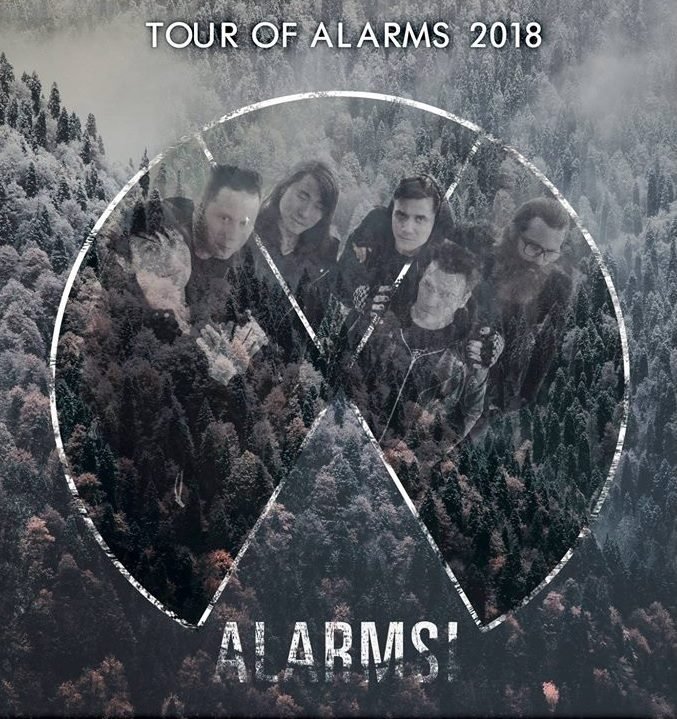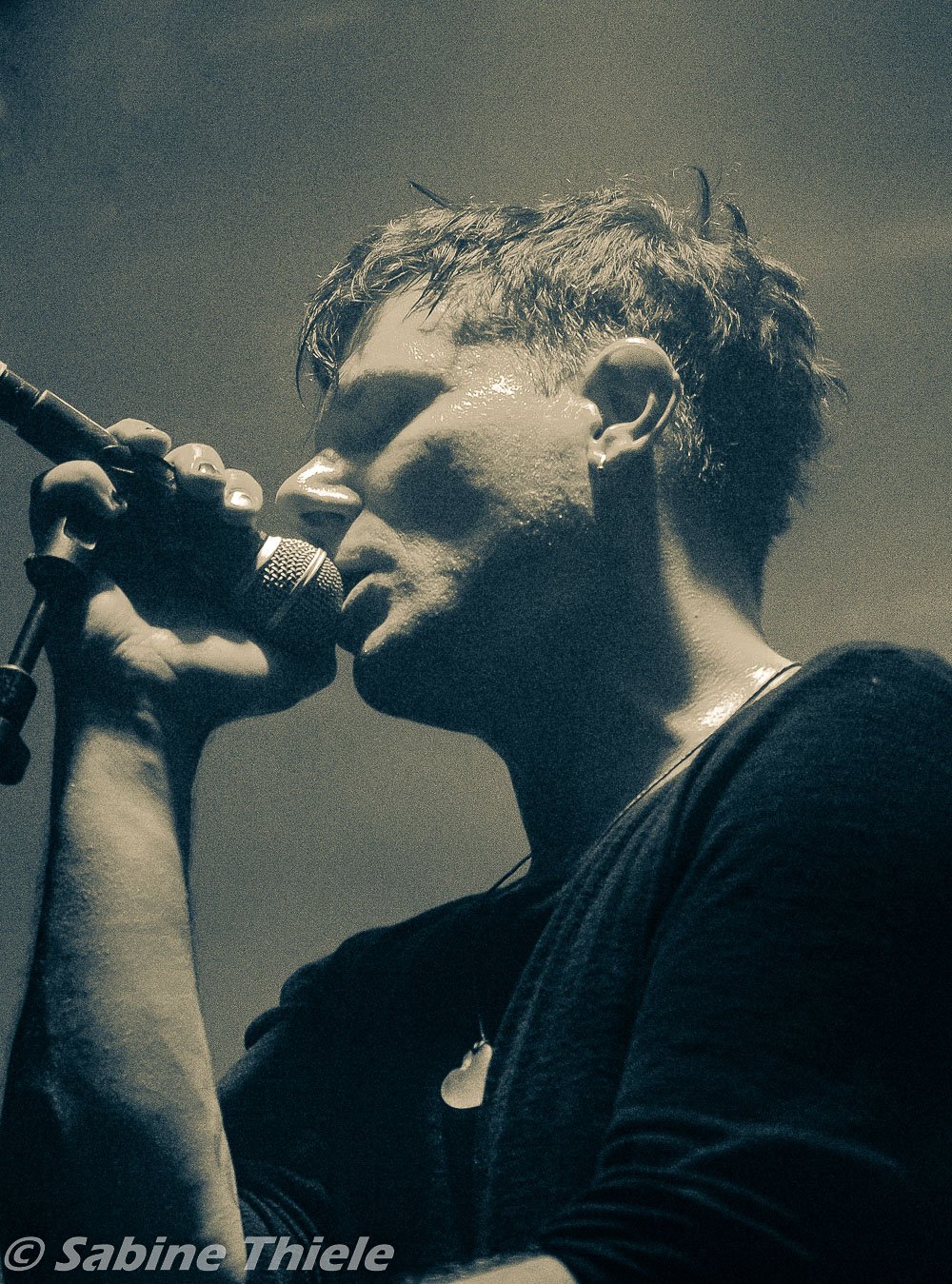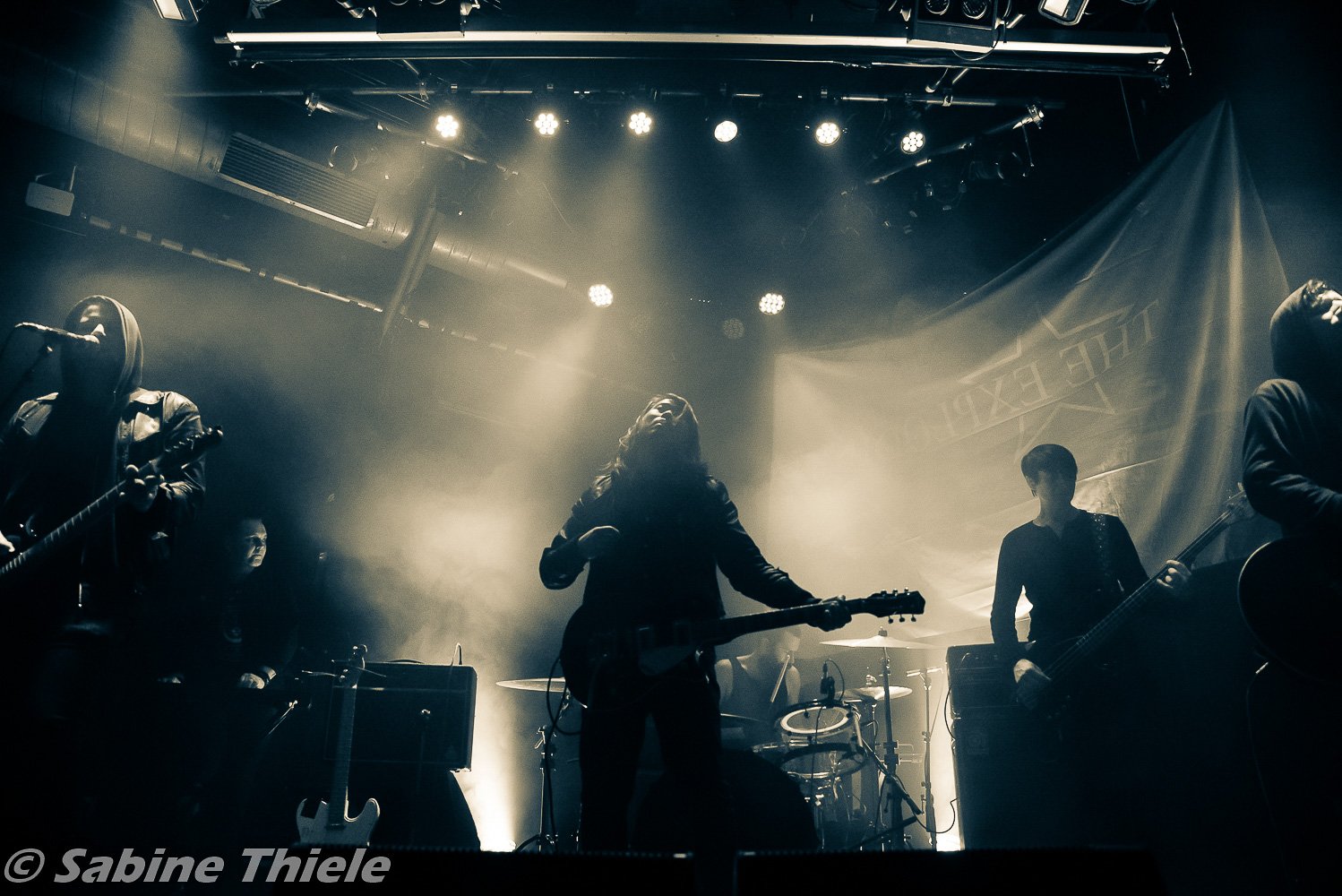Wissenswertes über Erlangen
Im Gespräch mit Johan Sjöblom (The Exploding Boy)
 Im Vorfeld des Konzerts von The Exploding Boy im Münchener Backstage Club (Link zur Review) vereinbarten wir mit Sänger Johan Sjöblom ein Interview, irgendwann zwischen Soundcheck und Show, am liebsten „in a nice pub“. Das ist im Umfeld vom Backstage eine zwar kaum lösbare Aufgabe, aber nun denn. Ein Facebook-Post zeigt uns am Nachmittag, dass The Exploding Boy die lange Fahrt aus Wien überstanden haben und im Backstage eingetroffen sind. Also machen wir uns [torshammare und Mrs. Hyde] auch auf den Weg und treffen um 18 Uhr ein. Das Backstage wird in langen Schlangen geradezu belagert von Minderjährigen, die im Nieselregen teilweise heftig am Vorglühen sind und auf Yung Hurn warten. Wir dürfen noch nicht aufs Gelände – und keine Nachricht von Johan. Der Soundcheck scheint sich hinzuziehen. Um 18:30 Uhr öffnet sich endlich das Tor, die Kids stürzen rein, und wir schieben uns außen rum vorbei Richtung Club. Johan treffen wir dort vor der Tür, wo er etwas verloren dasteht. Wir begrüßen uns erstmal, er stellt uns kurz Les Andersson und Matthias Svensson vor, die gerade rauskommen. Johan schlägt uns für das Interview spontan den Reitknecht vor, die kleine Kneipe vom Backstage, denn bei dem mistigen Wetter mag er ebenso wenig woanders hin wie wir. Aber die Räumlichkeit erweist sich als ungeeignet. Mangels Alternativen in der Nähe verschieben wir das Interview erstmal, das wird wohl doch per Email ablaufen. Dafür unterhalten wir uns einfach total nett und entspannt.
Im Vorfeld des Konzerts von The Exploding Boy im Münchener Backstage Club (Link zur Review) vereinbarten wir mit Sänger Johan Sjöblom ein Interview, irgendwann zwischen Soundcheck und Show, am liebsten „in a nice pub“. Das ist im Umfeld vom Backstage eine zwar kaum lösbare Aufgabe, aber nun denn. Ein Facebook-Post zeigt uns am Nachmittag, dass The Exploding Boy die lange Fahrt aus Wien überstanden haben und im Backstage eingetroffen sind. Also machen wir uns [torshammare und Mrs. Hyde] auch auf den Weg und treffen um 18 Uhr ein. Das Backstage wird in langen Schlangen geradezu belagert von Minderjährigen, die im Nieselregen teilweise heftig am Vorglühen sind und auf Yung Hurn warten. Wir dürfen noch nicht aufs Gelände – und keine Nachricht von Johan. Der Soundcheck scheint sich hinzuziehen. Um 18:30 Uhr öffnet sich endlich das Tor, die Kids stürzen rein, und wir schieben uns außen rum vorbei Richtung Club. Johan treffen wir dort vor der Tür, wo er etwas verloren dasteht. Wir begrüßen uns erstmal, er stellt uns kurz Les Andersson und Matthias Svensson vor, die gerade rauskommen. Johan schlägt uns für das Interview spontan den Reitknecht vor, die kleine Kneipe vom Backstage, denn bei dem mistigen Wetter mag er ebenso wenig woanders hin wie wir. Aber die Räumlichkeit erweist sich als ungeeignet. Mangels Alternativen in der Nähe verschieben wir das Interview erstmal, das wird wohl doch per Email ablaufen. Dafür unterhalten wir uns einfach total nett und entspannt.
Größtenteils läuft das Gespräch auf Englisch, aber teilweise auch auf Deutsch, denn Johan ist zur Hälfte Deutscher, wie er uns erzählt. Familienbedingt war er als Kind viel in Erlangen, spricht ganz passabel Deutsch und noch dazu gern. Das Publikum in Deutschland ist allerdings zugegeben manchmal wirklich steif, meint er, auch wenn alle hinterher sagen, wie toll das Konzert war. Vor allem Hannover ist ihm so in Erinnerung geblieben. Die Berliner sind auch schwierig, weil die „too much of everything“ haben und verwöhnt sind. Die Schweden stehen aber auch nur herum, gibt er dann zu und schließt sich selbst dabei nicht aus. torshammare empfiehlt ihm daher, doch mal seine deutsche Seite herauszulassen. Wir erfahren ein bisschen was über die Stockholmer Szene, die zwar klein ist, aber gut vernetzt. Man kennt sich untereinander und hängt auch viel miteinander ab. Vor allem Principe Valiente sind gute Freunde von XBOY, und deren Drummer Joakim Janthe hat auch auf dem Sjöblom-Soloalbum 6 (Link zur Review) getrommelt. Das hat seitens des eigenen Drummers Richard Ankers zu Beschwerden geführt, der sich ein bisschen übergangen gefühlt hat. Johan führt die noch recht unbekannten, aber wunderbaren A Projection an, Then Comes Silence, Agent Side Grinder, Henric de la Cour, It’s For Us und Kite. Mit Kite haben XBOY gerade etwas „beef“, weil sie daheim gerade sehr gehyped werden (drei Konzerte in Folge nach jeweils zehn Sekunden ausverkauft), dabei würden Nicklas Stenemo und Christian Berg ja nur ein Knöpfchen drücken anstatt richtig Musik zu spielen. Und Kite mokieren sich darüber, dass The Exploding Boy sich „erste Stockholmer Band“ aufs Banner schreiben, obwohl das zutreffend ist.
Auf der aktuellen Tour war Zürich eine tolle Erfahrung, denn die Show war vor 700 Leuten in einem tollen Venue, dessen Backstagebereich so groß war wie sonst meist der ganze Club. Außerdem hat der Shuttle Service vom und zum Flughafen für Rockstar-Feeling gesorgt. Dann erinnern wir uns an die Gigs in München und Augsburg, die nun schon lange zurückliegen und an die tollen Festival-Auftritte beim WGT und Amphi. So ganz ohne Alkohol läuft so etwas ja in der Regel nicht ab, daher verrät uns Johan das beste Mittel gegen einen massiven Kater am Morgen danach: das gute alte Grufti-Getränk Korea, also Rotwein und Cola. Das hilft sogar „after doing shots all night long“, wenn einem kotzübel ist, aber man genau das wegen der Stimmbänder nicht machen darf.
Es zieht uns dann nach drinnen, und Johan verschwindet im Backstage-Bereich. Hat er noch mal schnell aufgeräumt? Denn plötzlich steht er neben uns und meint, wir sollten das Interview jetzt einfach schnell im Backstage machen. Gesagt, getan, also klettern wir am Schlagzeug vorbei über die Bühne und lassen uns hinten nieder, wo Johan uns erst einmal ein Bier anbietet, das ich dankbar annehme. Nach zwei Schlucken legt sich die nun doch stark angestiegene Nervosität ein wenig. Die Raygun Rebels bereiten sich gerade auf ihren Auftritt vor, lassen sich von uns aber nicht stören, und so kann das Interview starten.
SB: Thanks, Johan, for talking to us! We’re delighted and a bit nervous, but …
JS: That’s good! Me too!
SB: You too? Okay *alle lachen* So, are you happy to be in Munich again after eight years? Nine years?
JS: Yes! The last show was … I don’t know … Can’t really remember. But it was really, really super fun. My guitar got stolen, a Stratocaster. I didn’t get it back, but Stefan used it as an extra guitar – I just play acoustic in this band. We used a spare guitar for the other gigs. But fuck that, it was long time ago. I bought new guitars, so that’s it for me.
SB: Good. But nothing like this happened on the tour now? No such unhappy incidents?
JS: You always lose stuff on tours.
SB: That’s a fact?
JS: That’s a fact! Smaller or bigger things. Normally smaller things.
SB: But nothing really important?
JS: No. I lost my hair straightener in Köln once. And Stefan – his pants were stolen, in Leipzig, I think. It was very strange. I don’t know how.
SB: That was a superfan, or …?
JS: Yeah, maybe. They weren’t on though. Someone went into his room and stole his pants. I don’t know. It was strange.
SB: Do you have any other strange stories from touring? Funny ones or horrible ones?
JS: Mostly funny ones.
SB: Do you have a favourite story you always tell?
JS: Yeah. It was in Bratislava. There’s a club under the castle in Bratislava, all the alternative people go there. And they were like crazy and it was packed and they took off their clothes. And we were „Oh my god, what’s happening?“, and they were dancing like hell. And two days ago we played in Prague, and some people from the concert were there. One broke his arm at this Bratislava-concert.
SB: Back then? And told you now?
JS: Yeah, he told us now. In Prague they took off their clothes as well. We had a mosh pit, people were dancing like crazy, on one side, and we had the dark cute Goth people on the other side of the room, standing and watching. That was fun.
SB: So … We talked about why Munich people are stiff, as you said …
JS: I haven’t really said that. *lacht* I like Munich people. [Anmerkung der Redaktion: Stefan hat dies in einem Interview mit dem Volt-Magazin gesagt.]
SB: But German people … do you see any categorisation about German people or German concert people?
JS: We really like to play in Germany. The people are really nice and friendly and like music a lot.
SB: Are there any differences to Sweden? To the Swedish audience?
JS: In Sweden it’s like … it’s all friends. You can only play in Stockholm, Malmö and Gothenburg. You can’t play anywhere else because it’s suicide, if you are a small band. Maybe they have some clubs here and there, but …
SB: So Stockholm, Malmö and Gothenburg.
JS: Yeah. In Germany you have a lot of cities and a lot more people. So it’s better and it’s much more fun.
SB: So people in Germany are more joyful …
JS: Yeah, they like music. It feels that they like music more. Maybe that’s not true, because Swedish people like music as well, but they don’t show it that much.
SB: You are named by a song by The Cure. They were probably a major influence when you started The Exploding Boy. Are there any other artists that have been an influence for you?
JS: I did a thing in the Sonic Seducer. Have you seen that one? Five albums which were important in my life. It was „Seventeen seconds“ by The Cure and Lloyd Cole. I like Lloyd Cole. And Alphaville. The first one. The first album I bought by myself.
SB: Did you get it in Germany or where they big in Sweden too?
JS: Ja, they were big in Sweden.
SB: There are a lot of German synth bands which are big in Sweden.
JS: Yeah. *lacht*
SB: I noticed that the Swedes love German synth and EBM and stuff like that.
JS: We do. I’m not really into that. I used to be a synth pop guy but I can’t say anything about EBM really.
SB: How do you define yourself as Exploding Boy? A Stockholm band or a Swedish band? Does Stockholm have a special influence on you, as a city, as the area you live in, where you have your friends …went to school maybe.
JS: Stockholm, Malmö and Gothenburg are so different. Bands who come from Gothenburg, it’s like some other kind of band. But if you go to another country we are Swedish as well.
SB: So in Sweden you define yourself – maybe – as a Stockholm band.
JS: Yeah. And from the South part of Stockholm, Södermalm.

SB: So, now it’s more than ten years for The Exploding Boy. What has changed since 2006? Of course there are two more band members now.
JS: We also had six in the beginning. At first there were me and Lars [Anm. d. Red: heute Les genannt], we started everything, with a computer. And then we wanted to play, so we just took friends along the way. So we got six people, we played a couple of gigs, then we made the first album. We never felt comfortable with the drummer and the bass player since we had made everything in the computer in the beginning. I liked the drum machine sound. So … I don’t know what happened, if someone got angry or someone said something strange, but the two members left the band. And then we were just booked at the WGT for the first time. And we thought „what the fuck should we do now?“, so we took the Air drum machine. Or backing tracks. And we’ve done that for eight years.
SB: Of course a live drummer is better than a drum machine, but I also like the sound because it has some 80s style. There are these 80s Goth bands with a drum machine, so …
JS: Yeah. But for the next WGT we wanted to do something special. So four or five years ago we thought that we should have a drummer and a bass player for the live show. So we took those two guys [Anmerkung der Redaktion: Mattias Svensson (Bass), Richard Ankers (Drums)], and it went so well that we thought „okay let’s do this“.
SB: We saw you live at WGT Parkbühne with the drum machine and with the drummer and the bass player …
JS: Yeah, yeah, WGT, that was our first gig.
SB: It was great. The sun was shining and you were blinded and said „It’s fucking hot here“. And then … Amphi a few years back … WGT at the Altes Landratsamt, the last gig on Monday, it was packed and very hot inside. I think you had the drummer with you.
JS: Yeah, that was the first gig with Richard.
SB: And then NCN two years ago.
JS: Yes, also with the drummer.
SB: And with the bass player, in the middle of the afternoon, the sun was blazing down …
JS: Yes, that was a good show. They are really good. The drummer used to play in a lot of good bands. Now he’s playing in IAMX, for example. That‘s cool.
SB: Has anything changed now in terms of songwriting, from four to six members? Except from trying hard not to become a drum and bass band?
JS: *überlegt* No, we do it the same way. They don’t really write songs, the bass player and the drummer, but they have ideas. And when we decide which songs should be on the album, they also decide of course. So for the band… we listen to them but the songwriting is the same.
SB: Does it feel different, being six people compared to four?
JS: Yeah, in the wallet, when you are supposed to tour somewhere. *alle lachen* But, no, it’s fun. They are so nice, so everyone is happy. And they are so competent musicians. They are sooo good. It’s crazy.
SB: So, next question – can you live on your music?
JS: No. Can any band? *alle lachen* Rammstein maybe. ABBA. *lacht*
SB: Hopefully, ABBA, yes. So, how do you manage the tour activities, band activities, family, job …
JS: Yeah, it’s a lot.
SB: And what is your job?
JS: Sitting at a computer. Some kind of administrator, stuff like that. I studied a little bit as well, to become an electrician.
SB: But not enough to get a degree?
JS: No, I sat two exams, and there are two left.
SB: Maybe you can start again?
JS: I have the solo project, band, family, electrician, work.
SB: No sleep …
JS: No sleep. *lacht* Aaah, what a mess.
SB: But are you happy, you and the band colleagues, with this life?
JS: Yes, yes.
SB: With band and job and family …
JS: When we play like this, it’s really reckless fun. We say, ah, we must play more. But more people are having children in the band, and it’s getting harder and harder. But … it works. And in the band we have backing tracks for all of our six people. So it’s a lot. We have backing tracks for the drummer, because he just had a little baby. When he can’t play, we have him on backing tracks. And we have the keyboard guy on backing tracks, if he can’t be there. So it’s me and Stefan, maybe the bass player, who must be there. I’m fucked, I have to be there. But you know, we played in Ireland, and the drummer was on backing tracks, and I was supposed to fly a day after the other guys. But they cancelled my flight and sent me down to Malaga, and then I missed the plane from Malaga to Dublin. So I was stuck in Malaga – and Stefan sang everything. It was only Stefan, Lars, Nick and Mattias. No drummer, no me. But … it worked.
SB: You’re travelling in different countries in Europe, you’ve been to America. Are there any differences regarding the fans – here in Europe or in America?
JS: America is fun. You have to play there a lot to get fans, but we’ve been playing in New York three times. So now they’re starting to know us. It’s really nice when people are coming back. New York people are very nice. We played seven gigs on the East Coast, from New York to Florida and some gigs in the middle. We have some fans here and there, but you have to start from the beginning again. But it’s an experience of course. It’s fun to go there. And you can see a lot of strange things in the cities.
SB: Any memorable thing coming to your mind?
JS: Yeah, in Charlotte we played in the suburbs. We were like the only white people in the whole place, and the hotel was like a strange hostel you’ve seen in the movies, where people get shot. Just hours before our concert there was this drug raid with police men and a fire thing behind the house. If it’s a fire thing, it’s some kind of meth lab. So we thought: „Oh God, we have to play here.“ But it’s a classic place, R.E.M. played there, Nirvana played there. We thought „it’s cool“. And we survived. Maybe it wasn’t dangerous at all, but we don’t know that.
SB: But it’s a cool story – meth lab behind your place. You don’t have that in Sweden, no?
JS: No. As far as I know …
[Les und Richard setzen sich zu uns. Kurze Diskussion, wie viel Zeit noch ist, wann die Vorband anfängt. Les futtert genüsslich Gummibärchen.]
SB: Are there any Swedish bands you would like to recommend to us?
JS: Tiger Lou.
SB: Good. What kind of music do they play?
JS: Indie. We have an intro before we’re playing, and the first song is Tiger Lou. We saw a really cool gig in Stockholm at a festival, and they were standing in a row, five or six people in the front, with the drummer and everything, all of them stood on the edge of the stage. It was so good.
SB: You don’t see that very often. So, Tiger Lou. Cool.
SB: Any other bands? Kite …
JS: You know those bands. *lacht*
SB: Yes, they are getting big in Germany.
JS: But we were the first band, really.
SB: We know! You were definitely the first one, absolutely. We will write that!
JS: We wrote that on some kind of review in Stockholm. We were the first band that played, and after that Kite and everyone came. Some of those bands got really really angry, but why? It was what happened.
LA: [Les schaltet sich ein] Viagra Boys! They’re kind of punk, sound a little bit like Jesus Lizard.
SB: Okay, thanks. Tiger Lou and Viagra Boys, perfect recommendations.
SB: Do you want to talk about politics? Because the song „Sign o the times“ is quite open about politics.
JS: Stefan should answer that. But the album is really political. And it works.
SB: Absolutely.
JS: We thought maybe it would be a bit too much. In the beginning of this tour he talked on stage about stuff like that. And then we said, „Stefan, we think it’s enough. People are here to have fun.“
SB: Is he going to say something today?
JS: No, he says fun things. He’s the fun guy.
SB: We know! I remember the Amphi gig when he said „Try wearing white clothes in the heat“, and all the people were like „no, no“. And you were on stage all dressed in white. That was really funny.
JS: Yeah, it was. *lacht*
SB: So … any alcohol recommendations? Do you have a favourite drink?
JS: Beer.
SB: Besides the hangover drink you talked about earlier, the Cola and wine mix.
JS: I like the local beers. I can recommend Czech beer. Like one Euro.
SB: Not like in Sweden!
SB: We have one very important question left. Sorry, we are a metal and goth webzine, so we can’t resist to ask: How about ABBA?
JS: How about ABBA? *ungläubig*
SB: Do you like them, do you hate them? Is it too much ABBA in Sweden?
JS: No, we don’t hate ABBA. Yeah, it’s too much ABBA in the whole world. But it’s well made music. It’s thought through and detailed.
JS zu LA: Gillar du ABBA? [Magst du ABBA?]
LA: ABBA, of course, I like them, really great. But I like Roxette more.
SB: Me too, me too! *alle lachen*
JS: We played in Bremen once and were sitting backstage and listening to Roxette, for hours. And the bookers were like „why are you sitting here, listening to Roxette?“
LA: You know, Roxette come from my home city.
SB: Ah, from Halmstad!
LA: That’s why we really like Roxette.
SB: I think, the fun thing about ABBA is, even when people hate them they still can sing the songs. Everyone can, even after five or six beers ABBA is no problem. *alle lachen*
SB: What are the questions you always want to be asked in an interview and they are never asked? Surely you have questions you hate. But what would you like to be asked?
[Alle Anwesenden – Les, Johan, Richard – überlegen] Because when you always get the same questions it gets boring.
JS: Yes, but I think this was not a regular question.
LA: Yeah, this was a good question. *alle lachen*
SB: Tack! Maybe you can think about that for the next interview.
LA: What city or place do you want to play? Oh, no, no, forget it.
SB: Would you like to be asked personal stuff in an interview or should it focus on the band, touring, music …?
JS: I think it’s fun with some personal stuff.
SB: Not too deep but to show that the interviewer had done their homework about the band?
JS: Yeah, that’s it.
SB: Do you want to add something personal? I know, that’s mean.
JS: No … my son thinks this is really cool.
SB: Going on tour, being a rock star?
JS: He’s three and a half years old and he said once: „When you’re not doing this any more, me and my friends are going to do it instead.“
SB: Being a band?
JS: Yeah, and I was like „What? Okay.“
SB: That’s super cute!
JS: I don’t know if he understood that much.
SB: Does he listen to music?
JS: Yeah, he likes music. He wants to listen to my songs all the time. The same songs from The Exploding Boy albums, pretty fast, all the time. So I say „no, I don’t wanna hear that song anymore! Listen to some other songs!“ And we have concerts at home. He stands in front of us, we sit on the sofa and he sings in a microphone and plays guitar.
[Vorband Raygun Rebels beginnt lautstark] „Clap your hands, father!“
SB: Well, I think, that’s a very beautiful ending to this interview. Because now it’s getting too loud. Tack så jättejättemycket, det var jättesnällt. [Vielen, vielen Dank, das war supernett.]

(4013)
